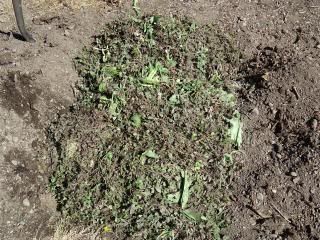digitS'
Garden Master
No, I'm not going to do it.
Each year, the potatoes are major recipients of my compost. I use it as mulch and in place of hilling. It is about time for me to spread the compost on about 100 square feet of potatoes and I've dang near got none!
Good Goobly Goop, where does it all go?!? I compost in pits about 8" down. Soil (and old compost) covers new compostables. I dig down to the bottom, put in a 5 gallon bucket, or several 5 gallon buckets, of compostables at a time. Here is a whole bunch of weeds that have been pulled from the dahlia garden. Under them is several inches of spent veggies and such:

No doubt, this is the most material I've put into that pit (about 4' by 10') this year. Still, I've had quite a lot to put in over the last few weeks - several buckets each week. I believe that I feed my compost with a generous hand! In fact, everything that I had except the frost-killed plants from the last time I mulched the potato bed was in that pit over the winter. The frost-killed plants all went directly into the garden beds rather than being composted over here.
When I showed up this spring, the pit was, well, almost a pit! What had been in it over winter had all but disappeared. I started filling again and have moved completely across it, covering a bucket or 2 at a time . . . Now, I'm moving across it for the 2nd time. See that little pile on the left with the shovel in it? That's all I've got after i.dont.know.how.many.weeks of feeding that compost! I might have have 2 wheelbarrow loads. And, you know? There's a lot of dirt in all my compost and what is there with the shovel -- it isn't fully composted!
If I wasn't afraid those weeds would come back to life, I might just mulch the potatoes with that! No. That doesn't appeal much to me. I better find some dirt somewhere and use it 50:50.
Where does it all go? I once read that composting reduces the material by 50%. I don't believe it! I doubt if I end up with more than 1 bucket of compost for every 10 that I put in there!
Steve
should edit to remove exclamation marks but i'm kinda aggravated!
Each year, the potatoes are major recipients of my compost. I use it as mulch and in place of hilling. It is about time for me to spread the compost on about 100 square feet of potatoes and I've dang near got none!
Good Goobly Goop, where does it all go?!? I compost in pits about 8" down. Soil (and old compost) covers new compostables. I dig down to the bottom, put in a 5 gallon bucket, or several 5 gallon buckets, of compostables at a time. Here is a whole bunch of weeds that have been pulled from the dahlia garden. Under them is several inches of spent veggies and such:

No doubt, this is the most material I've put into that pit (about 4' by 10') this year. Still, I've had quite a lot to put in over the last few weeks - several buckets each week. I believe that I feed my compost with a generous hand! In fact, everything that I had except the frost-killed plants from the last time I mulched the potato bed was in that pit over the winter. The frost-killed plants all went directly into the garden beds rather than being composted over here.
When I showed up this spring, the pit was, well, almost a pit! What had been in it over winter had all but disappeared. I started filling again and have moved completely across it, covering a bucket or 2 at a time . . . Now, I'm moving across it for the 2nd time. See that little pile on the left with the shovel in it? That's all I've got after i.dont.know.how.many.weeks of feeding that compost! I might have have 2 wheelbarrow loads. And, you know? There's a lot of dirt in all my compost and what is there with the shovel -- it isn't fully composted!
If I wasn't afraid those weeds would come back to life, I might just mulch the potatoes with that! No. That doesn't appeal much to me. I better find some dirt somewhere and use it 50:50.
Where does it all go? I once read that composting reduces the material by 50%. I don't believe it! I doubt if I end up with more than 1 bucket of compost for every 10 that I put in there!
Steve
should edit to remove exclamation marks but i'm kinda aggravated!

 We started wondering if we are just spreading weeds all over the place. Do your weeds turn into compost?
We started wondering if we are just spreading weeds all over the place. Do your weeds turn into compost?